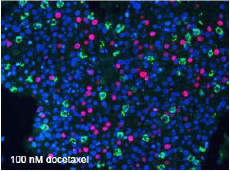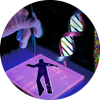About D. C. (Dik) van Gent, PhD
Introduction
Dik van Gent studied biology in Utrecht and did his PhD research at the Netherlands Cancer Institute (Amsterdam) under the supervision of Prof. R.H.A. Plasterk. He investigated various aspect of the HIV DNA integration reaction. After receiving his PhD in 1993, he did three years of post doc research at the National Institutes of Health in Bethesda (USA) under the supervision of Dr. M. Gellert.

During most of this time he was supported by an EMBO long term fellowship. He unraveled the basic mechanism of RAG1/2 mediated V(D)J recombination, which generates the antigen receptor diversity in B and T cells. For this work he received the biennial prize of the Netherlands Society of Biochemistry and Molecular Biology (NVBMB) in 1997. In 1996 he moved to the Erasmus University Rotterdam (now Erasmus MC), Department of Molecular Genetics. He received a KNAW fellowship to establish his own line of research here. Since then he received research funding from the Netherlands Scientific Organization (NWO), the Netherlands Cancer Foundation (KWF), the Association for International Cancer Research (AICR) and the European Union.
He studied many aspects of DNA double strand break repair, with emphasis on the non-homologous end-joining pathway. More recently, he concentrated on studying the effects of chemotherapy, radiotherapy and targeted therapy in various types of cancer tissues using ex vivo culture methods. He authored approximately 100 peer-reviewed papers.
He is currently a course director of the Research Master program Molecular Medicine and coordinator of the theme ‘oncology’ of the medical Bachelor program.
Field(s) of expertise
Research
The group studies various aspects of DNA double strand break repair, with an emphasis on a better understanding of DNA damaging anti-tumor therapies and how these therapies can be optimized for specific tumors. For this purpose we have developed novel technology to allow direct investigation of DNA damage responses in tumor tissue slices derived from fresh clinical samples. We also carry out more mechanistic studies, which currently concentrate mainly on PARP inhibitor for BRCA-mutated tumors.
DNA damage responses in tissues and tumors
We study DNA damage responses in cells within tissues and tumours. In collaboration with the Departments of Medical Oncology, Radiotherapy and Pathology we develop novel techniques to study DNA repair, cell cycle checkpoint activation and apoptosis in living breast, head-and-neck and ovarian tumour slices, with the ultimate goal to develop methods to predict treatment response in the tumour. An important focus is at this moment on tumour sensitivity to PARP inhibitors, which have been approved for use in hereditary breast and ovarian cancer, but may also be useful for treatment of selected sporadic tumours. In addition to germline mutated BRCA2-deficient tumors, we also identified BRCA1 promoter methylation and other defects that can inhibit homologous recombination repair of DNA double strand breaks, making them PARP inhibitor sensitive. In collaboration with the Department of Medical Oncology we are currently running a clinical trial to validate the functional Homologous Recombination Repair (RECAP) assay as a selection method for use of the PARP inhibitor Talazoparib.

In collaboration with the Department of Radiotherapy we are currently developing methods to predict head-and-neck squamous cell carcinoma (HNSCC) and breast cancer response to radiotherapy (X-rays and proton radiotherapy). In collaboration with the Department of Medical Oncology we are adapting the breast tumour slice culture system to assess chemotherapy sensitivity (e.g. to carboplatin and paclitaxel).
Publications
- Meijer TG, Nguyen L, Van Hoeck A, Sieuwerts AM, Verkaik NS, Ladan MM, Ruigrok-Ritstier K, van Deurzen CHM, van de Werken HJG, Lips EH, Linn SC, Memari Y, Davies H, Nik-Zainal S, Kanaar R, Martens JWM, Cuppen E, Jager A, van Gent DC (2022) Functional RECAP (REpair CAPacity) assay identifies homologous recombination deficiency undetected by DNA-based BRCAness tests. Oncogene 41:3498-3506
- Chakrabarty S, Quiros-Solano WF, Kuijten MMP, Haspels B, Mallya S, Lo CSY, Othman A, Silvestri C, van de Stolpe A, Gaio N, Odijk H, van de Ven M, de Ridder CMA, van Weerden WM, Jonkers J, Dekker R, Taneja N, Kanaar R, van Gent DC. (2022) A Microfluidic Cancer-on-Chip Platform Predicts Drug Response Using Organotypic Tumor Slice Culture. Cancer Res. 82:510-520
- Capala ME, Pachler KS, Lauwers I, de Korte MA, Verkaik NS, Mast H, Jonker BP, Sewnaik A, Hardillo JA, Keereweer S, Monserez D, Koljenovic S, Mostert B, Verduijn GM, Petit S, van Gent DC (2023) Ex Vivo Functional Assay for Evaluating Treatment Response in Tumor Tissue of Head and Neck Squamous Cell Carcinoma. Cancers 15:478
Mechanisms of DNA double strand break repair and PARP inhibitor resistance
We study various aspects of DNA double strand break repair, with an emphasis on the Non-homologous end-joining (NEHJ) pathway and on BRCA1/2 deficiency and PARP inhibitor sensitivity. We previously identified several NHEJ defects in Severe Combined Immuno Deficiency (SCID) patients and determined the functional consequences of these mutations. We also studied the basic mechanistic aspects of this DNA repair pathway using biochemistry, cell biology and animal models. Current research is concentrating on DNA repair defects in BRCA mutated tumors and how sensitivity and resistance to PARP inhibition are regulated.

Publications
- Barazas, M., Annunziato, S., Pettitt, S.J., de Krijger, I., Ghezraoui, H., Roobol, S.J., Lutz, C., Frankum, J., Song, F.F., Brough, R., Evers, B., Gogola, E., Bhin, J., van de Ven, M., van Gent, D.C., Jacobs, J.J.L., Chapman, R., Lord, C.J., Jonkers, J., Rottenberg, S. (2018) The CST Complex Mediates End Protection at Double-Strand Breaks and Promotes PARP Inhibitor Sensitivity in BRCA1-Deficient Cells. Cell Rep. 23:2107-2118
- Meijer T.G., Verkaik, N.S., van Deurzen, C.H.M., Dubbink, H.J., …, van Gent, D.C., Jager, A. (2019) Direct Ex Vivo Observation of Homologous Recombination Defect Reversal After DNA-Damaging Chemotherapy in Patients With Metastatic Breast Cancer. JCO Precision Oncology 3: 1-12
- Zhang, W., Liao, C.Y., Chtatou, H., Incrocci L, van Gent, D.C., van Weerden, W.M., Nonnekens, J. (2019) Apalutamide Sensitizes Prostate Cancer to Ionizing Radiation via Inhibition of Non-Homologous End-Joining DNA Repair. Cancers 11: 1593
- Inagawa, T., Wennink, T., Joyce H. G. Lebbink, J.H.G., Keijzers, G., Florea, B.I., Verkaik, N.S., van Gent, D.C. (2020) C-Terminal extensions of Ku70 and Ku80 differentially influence DNA end binding properties. Int J Mol Sci. 14: 6725
Publications
Key publications
- Nonnekens J, van Kranenburg M, Beerens CE, Suker M, Doukas M, van Eijck CH, de Jong M, van Gent DC (2016) Potentiation of Peptide Receptor Radionuclide Therapy by the PARP Inhibitor Olaparib. Theranostics 6: 1821-32
- Meijer, T.G., Verkaik, N.S., Sieuwerts, A.M., van Riet, J., Naipal, K.A.T., van Deurzen, C.H.M., den Bakker, M.A., Sleddens, H.F.B.M., Dubbink, H.J., den Toom, T.D., Dinjens, W.N.M., Lips, E., Nederlof, P.M., Smid, M., van de Werken, H.J.G., Kanaar, R., Martens, J.W.M., Jager, A., van Gent, D.C. (2018) Functional Ex Vivo Assay Reveals Homologous Recombination Deficiency in Breast Cancer Beyond BRCA Gene Defects. Clin. Cancer Res. 24:6277-6287
- Meijer T.G., Verkaik, N.S., van Deurzen, C.H.M., Dubbink, H.J., …, van Gent, D.C., Jager, A. (2019) Direct Ex Vivo Observation of Homologous Recombination Defect Reversal After DNA-Damaging Chemotherapy in Patients With Metastatic Breast Cancer. JCO Precision Oncology 3: 1-12
- Inagawa, T., Wennink, T., Joyce H. G. Lebbink, J.H.G., Keijzers, G., Florea, B.I., Verkaik, N.S., van Gent, D.C. (2020) C-Terminal extensions of Ku70 and Ku80 differentially influence DNA end binding properties. Int J Mol Sci. 14: 6725
- Meijer TG, Nguyen L, Van Hoeck A, Sieuwerts AM, Verkaik NS, Ladan MM, Ruigrok-Ritstier K, van Deurzen CHM, van de Werken HJG, Lips EH, Linn SC, Memari Y, Davies H, Nik-Zainal S, Kanaar R, Martens JWM, Cuppen E, Jager A, van Gent DC (2022) Functional RECAP (REpair CAPacity) assay identifies homologous recombination deficiency undetected by DNA-based BRCAness tests. Oncogene 41:3498-3506
- Chakrabarty S, Quiros-Solano WF, Kuijten MMP, Haspels B, Mallya S, Lo CSY, Othman A, Silvestri C, van de Stolpe A, Gaio N, Odijk H, van de Ven M, de Ridder CMA, van Weerden WM, Jonkers J, Dekker R, Taneja N, Kanaar R, van Gent DC. (2022) A Microfluidic Cancer-on-Chip Platform Predicts Drug Response Using Organotypic Tumor Slice Culture. Cancer Res. 82:510-520
- Capala ME, Pachler KS, Lauwers I, de Korte MA, Verkaik NS, Mast H, Jonker BP, Sewnaik A, Hardillo JA, Keereweer S, Monserez D, Koljenovic S, Mostert B, Verduijn GM, Petit S, van Gent DC (2023) Ex Vivo Functional Assay for Evaluating Treatment Response in Tumor Tissue of Head and Neck Squamous Cell Carcinoma. Cancers 15:478.
- Ladan MM, Meijer TG, Verkaik NS, de Monye C, Koppert LB, Oomen-de Hoop E, van Deurzen CHM, Kanaar R, Nonnekens J, van Gent DC, Jager A. (2023) Proof-of-concept study linking ex vivo sensitivity testing to neoadjuvant anthracycline-based chemotherapy response in breast cancer patients. NPJ Breast Cancer 9:80
Teaching activities
Teaching
Dik van Gent is involved in teaching at various levels.
He is coordinator of the Oncology course for second year medical students. He also coordinates the minor ‘Biomedical research in practice’ for third year medical students and Erasmus University College students. Furthermore, he is a course director in the MSc program Molecular Medicine, which offers a two year master of science curriculum for medical and biomedical students, where student study molecular cell biology in the context of medically relevant research topics.

Contact information:
Dr. Dik C. van Gent
Dept. of Molecular Genetics
Erasmus MC
PO Box 2040
3000 CA Rotterdam
The Netherlands
Tel. +31-10-7043932
e-mail: d.vangent@erasmusmc.nl
Ba ‘Oncology’
In the second year of their curriculum, medical students follow a 13-week course on basic, clinical and psychological aspects of cancer. Students learn step by step how a normal cell becomes a cancer cell and a tumor. Subsequently, they learn how the general and tumor type specific treatment is currently organized. Finally, students also get a perspective of the fast moving field of modern fundamental and clinical cancer research. Dr. Dik van Gent coordinates this course, together with a medical oncologist, Dr. Ferry Eskens. He also coordinates one of the two integrated exams.
Minor ‘Biomedical Research in Practice’
At the start of their third year, students of the medical curriculum, the Erasmus University College and Nanobiology can choose to follow an in depth course on biomedical research. They get a firm basis in molecular cell biology and learn how to work in a modern biomedical research setting. Together with Dr. Ines Chaves, Dr. Dik van Gent coordinates this 10-week course and teaches several elements in this course.
MSc Molecular Medicine




